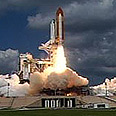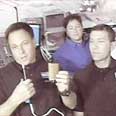


I held my breath because I very clearly remember the last time a space shuttle was in the sky. It was more than two years ago, as a wintertime Shabbat in Israel was ending. It was a dark time in Israel. The country was deep in the throes of the suicide bomber phase of the Palestinian intifada. In previous weeks and months, dozens of suicide bombers had struck the country, killing scores and wounding hundreds.
But for the two-week period of Columbia's flight our eyes, heads and hearts were lifted to the heavens. Our man - Israeli Air Force Colonel Ilan Ramon - was on the flight. The wall-to-wall news coverage and frequent appearances Ramon made on TV, during which he carefully presented symbolic, meaningful and moving performances, only cemented our connection with him.
Reuters video of Discovery's launch
Then Ramon was in space, holding court with earthbound English and Hebrew-speaking interviewers, smiling his shy smile and joking with Prime Minister Ariel Sharon.
Floating kiddush cup
In one instance he let go of a kiddush cup he had brought to space with him, and with which he planned to celebrate Shabbat, and grinned gently as it floated lazily in front of him in the shuttle's weightless environment.
At another point, on a live broadcast only to Israel, Ramon displayed a paperback-sized Torah scroll and told Sharon the little Torah's story: It had survived the Holocaust and had made it to Israel in the possession of a teenaged boy who had become one of the country's leading physicists and the architect of one of Ramon's space experiments.
Then, a few days later, only 16 minutes from landing after the 16-day mission that had carried Israel's hopes into space during that dark period, we lost Ramon and his six American colleagues in a fiery accident. The same white column of smoke that had trailed the shuttle into space this time betrayed Columbia's astronauts. Stunning, heartbreaking video footage showed how the single pipe of exhaust split into two and then additional trails, as the shuttle broke up and disintegrated.
We later learned of the plaintive calls for Columbia from NASA Mission Control in Houston, and how Shuttle Commander Rick Hudson's last comment from space ended in the middle of a wo--
What else?
As Shabbat ended in Israel and the country became aware of the disaster's magnitude, the single question everyone asked was, "What else can happen to us?"
In the following days, the quiet dignity of Ramon's widow and children, and the solemnity with which he was returned to us for burial, served somewhat to salve our psyches.
We grimly went back to work, determined to continue to fulfill Ramon's dreams and ours - to build a peaceful, democratic, economically strong and spiritually sound country.
Our loss of Ramon was by far not the only one of that period. And the losses continue, as terror, pollution, traffic accidents, stress, and poverty take their toll on the country and our people. But in the same way that NASA has tried to heal its technology and culture, we have worked hard to address our problems.
We are closer to peace, closer to resolving our problems, closer to each other than we were two years ago, despite what you read in the headlines.
With men and women in the heavens once again, we can once again begin to believe that we, too, can triumph over our failures, weaknesses and slip-ups. We are not perfect; though we soar in the heavens, we are not angels. But we can progress and grow, build and develop, dream and hope.
And we know we can do it in Israel, a land of hopes and dreams as much as milk and honey. A land we have returned to with an optimism only rarely shaken, only rarely sidetracked, even by the hardest collisions and most fiery explosions.















